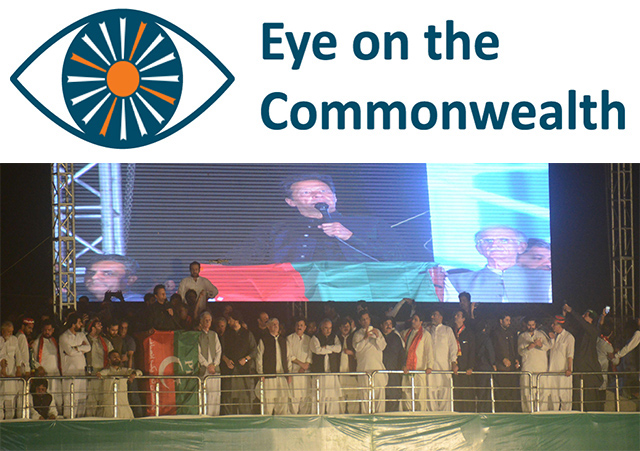 14 April: Ousted Pakistan's prime minister Imran Khan delivers a speech to Pakistan Tehreek-e-Insaf (PTI) party supporters during a public rally in Peshawar. (Photo: Alamy, Credit Image: © Hussain Ali/Pacific Press via ZUMA Press Wire)
14 April: Ousted Pakistan's prime minister Imran Khan delivers a speech to Pakistan Tehreek-e-Insaf (PTI) party supporters during a public rally in Peshawar. (Photo: Alamy, Credit Image: © Hussain Ali/Pacific Press via ZUMA Press Wire)
Imran Khan became the first prime minister of Pakistan to lose power through a no-confidence vote in the National Assembly, ending a four-year term for the cricket hero-turned-politician. But even if it was not done openly, many observers regard his dramatic ouster this month as confirming the Pakistani military’s role as kingmakers. Although some believe ‘this regime-change process has thus far played out independently of the military’, most analysts see Khan as having been turfed out by the generals who installed him in 2018.
Replacing the populist Khan, seen by his supporters as an outsider bravely taking on a corrupt establishment, is a politician who embodies the status quo: Shehbaz Sharif, younger brother of the three-time prime minister Nawaz, who was removed from office over corruption allegations following the 2016 Panama Papers leak. Shehbaz’s family also faces allegations of corruption – the latest being a summons for him and his son to face money-laundering charges. However, the new PM is regarded as a consummate insider, unlike Khan; a realist who accepts Pakistan’s ‘hybrid’ military-civilian regime, wants dialogue with India, and is credited with rebuilding Lahore’s infrastructure as Punjab’s chief minister.
By contrast, Khan was long seen as being more comfortable in London’s party scene than Pakistan’s corridors of power. By the 1990s, though, the ambitious former playboy, with a long-unacknowledged child from an affair, was reborn as a high-minded politician. Once married to the socialite daughter of a Jewish tycoon, Khan wed his niqab-wearing ‘spiritual adviser’ three months before the 2018 election. His latter-day piety has electoral appeal and his party, Pakistan Tehreek-e-Insaf (PTI), moved from the fringes of politics in the 1990s to centre stage, claiming 10 million members by 2012. With the illustrious celebrity that comes from leading his cricket-mad nation to a first World Cup, and seen as honest in a notoriously corrupt political system, Khan drew huge crowds to PTI rallies.
But he became a victim of his own rhetoric, unable to live up to the promises of his ‘100-day plan’, which included creating 10 million jobs, building five million houses, improving education in a country with 40% illiteracy, and ending routine tax evasion across Pakistan, where less than 1% of the population pay income tax. Four years later, one commentator said: ‘Two words now define his legacy as PM: arrogance and incompetence … he has been unable to fulfil a single promise.’ Instead, he was accused of ‘cracking down on the media to prevent it from giving space to the opposition’.
Several of Khan’s MPs defected to the joint opposition, led by the two dynastic powers of Pakistan: the Pakistan Muslim League-Nawaz (PML-N), led by the Sharifs, and the Pakistani People’s Party of the Bhuttos. Behind the scenes, said analysts, the generals had lost faith in Khan after he clashed with them over foreign policy. While he was rebuffing Washington’s overtures in favour of closer ties with China, they wanted to hedge their bets by pivoting back towards the US.
After the PTI lost its majority, and facing a no-confidence vote, his supporters filibustered in the National Assembly. Khan then dissolved parliament to block the vote and hold fresh elections – a move overturned by the supreme court as unconstitutional. The prime minister, however, claimed the ‘establishment’ (AKA the military) had given him three options: ‘resignation, no-confidence [vote] or elections’.
Khan has reacted to his removal from office by claiming he was the victim of a ‘foreign conspiracy of regime change’. In what the BBC described as an ‘outlandish explanation for his political troubles’, he claimed US officials had warned Pakistani diplomats that he had to be removed from power because of his criticism of the US ‘War on Terror’ and his foreign policy, such as visiting Moscow to meet President Vladimir Putin. According to the Indian news site Tehelka, Russia ‘reciprocated his gesture by stating that events in Pakistan were a sign that Washington was making “disobedient” Khan pay the price for going to Moscow’. Though his supporters believe the claims, most analysts dismissed them as being unsubstantiated.
A Pakistani military spokesman called the allegations ‘embarrassing’, while Abdul Qayyum, a retired general and former PML-N senator, told the Financial Times: ‘Khan has tried to cover up many shortcomings in his own government by pushing the conspiracy line.’ Writing in the Washington Post, Hamid Mir said Khan only had himself to blame and was resorting to ‘a tactic that he has long used to discredit his critics … without ever producing anything in the way of evidence’. One analyst asked why, if the CIA was planning ‘regime change’ in March, the IMF would disburse $1bn and the World Bank $529m to Pakistan in February. Another writer argued that Khan was not blaming the military for his removal from office because ‘behind his petulant facade, there is a pragmatist … Khan himself doesn’t want to burn the bridge that may one day bring him back to office.’



